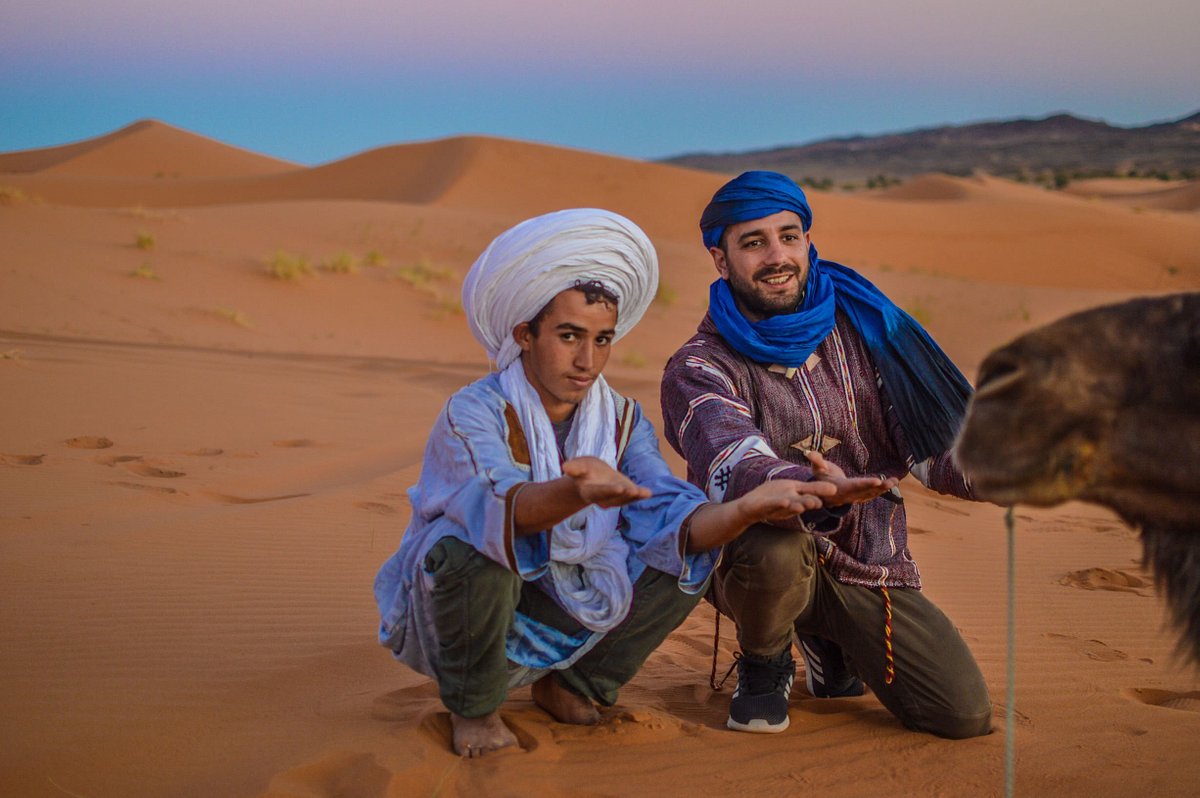Moroccan Traditions and culture
MOROCCAN KITCHEN:
The Moroccan kitchen is an important element to take into consideration when talking about the Moroccan traditions, it is rich and tasty, plagues having contributed to culinary influence. The Arab Bedouins introduced dates, milk, and bread, which still constitute the basic food.
Maures for their part brought the ingredients of the Andalusia kitchen (olives, olive oil, hazelnuts, almonds, fruits, and aromatic grasses) while the Arabs enriched the Moroccan kitchen of spices. The Berber influence is in most spread dishes. The most famous is the couscous, where mixed tastes of the steamed semolina, of the meat, sweet-scented vegetables, and of a seasoned condiment, the harissa. Tajines are meat ragouts perfumed in the aromatic grasses and for a long time prepared in dishes in baked clay.
There is an infinite variety there. Preserved chickens-lemons are the most common. Moreover, we can not talk about the Moroccan traditions concerning cuisine without talking about the famous dishes of The Choui (Moroccan BBQ), a whole roast lamb, traditionally accompanied by liver and lamb’s heart skewers. Other Berber specialties, the Harira (Soup) is a thick soup prepared with some sheep meat, lenses, means peas, onions, with some garlic, aromatic grasses, and with some spices is. They traditionally serve it to breakfasting, during the Ramadan.
The tourist is very in love with the Pastilla, it is indeed one of the most refined dishes of the Moroccan kitchen. It is about a pie to the pigeon livened up of eggs and accompanied with lemon, with almonds, with cinnamon, with saffron and with sugar, which is baked in fine leaves of Ouarka. A large choice of pastries – in general, composed of honey, almonds, and cinnamon – delightful with a mint tea is finally found in Morocco
THE HAMMAM, THE MOROCCAN TRADITIONS SAUNA:
The Hammam ( Moroccan bath) is about 3 baths located in 3 rooms in succession. This traditional sauna is the best place where to relax after a tiring day. Men and women have separated Hamams. When there is only one Hammam, the women use it in general in the morning and the men in the afternoon. Today even, the Hammam represents for some women the occasion to meet, it is also where the mothers came to sound the physical attributes of their future stepdaughter!
Knowing about the Moroccan traditions will not complete without experiencing the Hammam. If you do not own your own soap, it is not a problem, there is a person who sells them and also it is the same person who gives tickets. Also, it is the same person who gives gloves for rubbing. Bring a towel to avoid burning your buttocks on the marble. Also think of the shampoo or the Ghassoul, this loam which strengthens hair. In the popular Hammams, they fix prices, about 10-15 Dh, rubbing-out and not including massage, services which you can take in more. In the big cities, luxury Hammams flourished. These are true beauty institutes, the entrance of which has to be paid as expensive as in big cities all over the world
THE LANGUAGE
One of the main things to know about Moroccan traditions is language. Classical Arabic is the language of education, administration, and media. The everyday language is dialectal Arabic. They speak Tamazight (Berber) in the Rif, Atlas regions, and Souss. These dialects vary according to regions. Most Moroccans speak French, many people speak Spanish and English. So you won’t have problems dealing or communicating with Moroccans everywhere.
THE FAMILY, THE ROOT OF THE MOROCCAN TRADITION:
The Moroccan families have a strong relationship between them; every Moroccan tie particular importance to his family. Little by little, this becomes modern. On the whole, they attend forced marriages, which becomes less recently. The polygamy is fewer commonplaces as it was. However, this modernity is not uniform, according to the place. The big cities westernized somehow their way of life. The women can easily go out there without a veil, in keepings which would be considered provocative elsewhere. The situation differs even today in the countryside, where the women are not much visible in public places and go out veiled. In these villages, Western women should look after their dress keeping to avoid robbing.
RELIGION
Islam is the official religion of the Kingdom, Morocco; the king is the religious leader of the country. 99 % of Moroccans are Muslim, mainly Sunni. The coexistence with other religions is about understanding it, the practice of other religions is guaranteed by the constitution. The cultural and commercial exchanges with Europe and occident in general influence Morocco for a moderate approach to Islam. Fundamentalist movements remain marginal in the country. Youth remains very believers but becomes a little less practicing. During the Ramadan, the Moroccans fast from dawn to sunset, they can not eat drink, or have any sexual relationship during the day time. It is however possible for tourists to have lunch in hotels if you are at midday in a city.
There are many other things to take into consideration when speaking about Moroccan traditions. However, the most important are family, religion, language, and cuisine.
- About Morocco
- Camel Trekking in Merzouga
- Contact us
- Days tours in Morocco
- Highlights of our Morocco Tours.
- How to choose your trip to Morocco
- MARRAKECH CAMEL TRIPS S.A.R.L
- Morocco itineraries
- Morocco travel advisory – Morocco travel advice
- Morocco Travel Blog
- Photos of Marrakech Camel trips
- Questions and answers
- Tour 4×4 in Merzouga Desert
- Trekking in the desert of Merzouga Erg Chebbi
- TV Quad Biking in Merzouga Desert in Morocco

